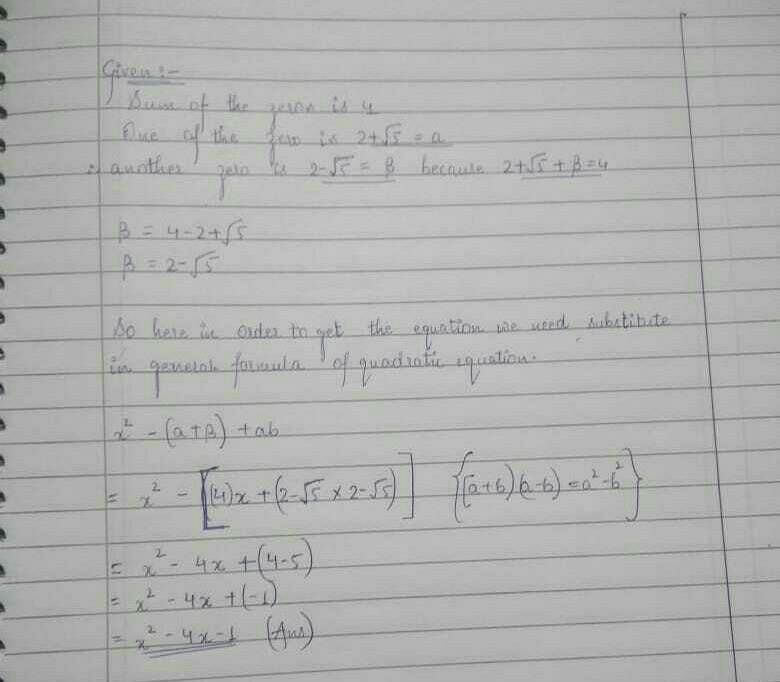Class 10 Exam > Class 10 Questions > form a quadratic polynomial , one whose zero ...
Start Learning for Free
form a quadratic polynomial , one whose zero is root2 plus 5 and the sum of zeroes is 4
Most Upvoted Answer
form a quadratic polynomial , one whose zero is root2 plus 5 and the s...
Forming a Quadratic Polynomial with a Given Zero and Sum of Zeroes
Introduction
In algebra, a quadratic polynomial is a polynomial of degree two. It is of the form ax² + bx + c, where a, b, and c are constants. The zeros of a quadratic polynomial are the values of x that make the polynomial equal to zero. In this problem, we are given one zero of the quadratic polynomial and the sum of the zeroes. We need to use this information to form the quadratic polynomial.
Given Information
We are given:
- One zero of the quadratic polynomial, which is root2 + 5.
- The sum of the zeroes, which is 4.
Solution
Since we are given one zero of the quadratic polynomial, we know that (x - (root2 + 5)) is a factor of the polynomial. To find the other factor, we can use the sum of the zeroes.
The sum of the zeroes of a quadratic polynomial is given by -b/a, where b and a are the coefficients of x and x² respectively. In this case, the sum of the zeroes is 4, so we have:
- (-b/a) = 4
We also know that the coefficient of x² is 1 (since it is not given). Therefore, we can write the quadratic polynomial as:
- (x - (root2 + 5))(x - p) = x² - (p + root2 + 5)x + (root2 + 5)p
where p is the other zero of the polynomial.
To find the value of p, we can substitute the sum of the zeroes in the above equation and solve for p.
- (-b/a) = 4
- => (p + root2 + 5)/1 = -4
- => p + root2 + 5 = -4
- => p = -4 - root2 - 5
- => p = -root2 - 9
Therefore, the quadratic polynomial is:
- (x - (root2 + 5))(x - (-root2 - 9)) = x² - 4x - 11
Conclusion
In this problem, we used the given information of one zero and the sum of the zeroes to form a quadratic polynomial. We found that the quadratic polynomial is x² - 4x - 11.
Community Answer
form a quadratic polynomial , one whose zero is root2 plus 5 and the s...

Attention Class 10 Students!
To make sure you are not studying endlessly, EduRev has designed Class 10 study material, with Structured Courses, Videos, & Test Series. Plus get personalized analysis, doubt solving and improvement plans to achieve a great score in Class 10.

|
Explore Courses for Class 10 exam
|

|
Similar Class 10 Doubts
form a quadratic polynomial , one whose zero is root2 plus 5 and the sum of zeroes is 4
Question Description
form a quadratic polynomial , one whose zero is root2 plus 5 and the sum of zeroes is 4 for Class 10 2024 is part of Class 10 preparation. The Question and answers have been prepared according to the Class 10 exam syllabus. Information about form a quadratic polynomial , one whose zero is root2 plus 5 and the sum of zeroes is 4 covers all topics & solutions for Class 10 2024 Exam. Find important definitions, questions, meanings, examples, exercises and tests below for form a quadratic polynomial , one whose zero is root2 plus 5 and the sum of zeroes is 4.
form a quadratic polynomial , one whose zero is root2 plus 5 and the sum of zeroes is 4 for Class 10 2024 is part of Class 10 preparation. The Question and answers have been prepared according to the Class 10 exam syllabus. Information about form a quadratic polynomial , one whose zero is root2 plus 5 and the sum of zeroes is 4 covers all topics & solutions for Class 10 2024 Exam. Find important definitions, questions, meanings, examples, exercises and tests below for form a quadratic polynomial , one whose zero is root2 plus 5 and the sum of zeroes is 4.
Solutions for form a quadratic polynomial , one whose zero is root2 plus 5 and the sum of zeroes is 4 in English & in Hindi are available as part of our courses for Class 10.
Download more important topics, notes, lectures and mock test series for Class 10 Exam by signing up for free.
Here you can find the meaning of form a quadratic polynomial , one whose zero is root2 plus 5 and the sum of zeroes is 4 defined & explained in the simplest way possible. Besides giving the explanation of
form a quadratic polynomial , one whose zero is root2 plus 5 and the sum of zeroes is 4, a detailed solution for form a quadratic polynomial , one whose zero is root2 plus 5 and the sum of zeroes is 4 has been provided alongside types of form a quadratic polynomial , one whose zero is root2 plus 5 and the sum of zeroes is 4 theory, EduRev gives you an
ample number of questions to practice form a quadratic polynomial , one whose zero is root2 plus 5 and the sum of zeroes is 4 tests, examples and also practice Class 10 tests.

|
Explore Courses for Class 10 exam
|

|
Suggested Free Tests
Signup for Free!
Signup to see your scores go up within 7 days! Learn & Practice with 1000+ FREE Notes, Videos & Tests.

























